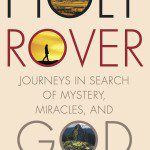![370472_1_ftc[1]](http://wp.production.patheos.com/blogs/holyrover/files/2010/12/370472_1_ftc1-197x300.jpg) I know what you’re probably thinking: how could the U.S. get its first official Marian apparition site and the Holy Rover not be on the scene with the breaking news? Later, my friends, later. I’ve got Champion, Wisconsin, on my list of must-see destinations, but in the meantime, I’m back blogging to tell you about the most lovely book I’ve been reading: Barbara Brown Taylor’s An Altar in the World: A Geography of Faith
I know what you’re probably thinking: how could the U.S. get its first official Marian apparition site and the Holy Rover not be on the scene with the breaking news? Later, my friends, later. I’ve got Champion, Wisconsin, on my list of must-see destinations, but in the meantime, I’m back blogging to tell you about the most lovely book I’ve been reading: Barbara Brown Taylor’s An Altar in the World: A Geography of Faith.
Subtitled “A Geography of Faith,” the book is a look at a dozen familiar and not-so-familiar spiritual practices. Taylor gives insights into traditional ones like the practice of prayer and the practice of pronouncing blessings. But where the book really sings is in chapters such as the practice of saying no, the practice of feeling pain, and the practice of wearing skin. Like the poet Rumi (whom she quotes at crucial points in the book), Taylor is able to imbue ordinary life with brilliant radiance.
My favorite is her chapter on the practice of getting lost. “God does some of God’s best work with people who are truly, seriously lost,” she writes, recalling the stories of Abraham and Sarah and the clueless Israelites, who needed forty years in the wilderness in order to learn the holy art of being lost. She says that popular religion focuses so hard on spiritual success that most of us do not know the first thing about the spiritual fruits of failure, and yet if someone asked us to pinpoint the times in our lives that changed us for the better, a lot of those times would be wilderness times.
“The practice of getting lost has nothing to do with wanting to go there,” she writes. “It is something that happens, like it or not. You lose your job. Your lover leaves. The baby dies. At this level, the advanced practice of getting lost consists of consenting to be lost, since you have no other choice. The consenting itself becomes your choice, as you explore the possibility that life is for you and not against you, in spite of all the evidence to the contrary.”
The book made me think of the times in my life I’ve been lost physically (including a number of times in foreign countries where I didn’t speak the language) and spiritually (which seems to happen on a regular basis). Thanks to Barbara Brown Taylor, I’ve come to understand how being lost can be a spiritual discipline, one unasked for, but valuable just the same.
Writes Taylor: “Anything can become a spiritual practice once you are willing to approach it that way—once you let it bring you to your knees and show you what is real, including who you really are, who other people are, and how near God can be when you have lost your way.”
If you’re looking for a fine book for a cold winter’s night–or for a companion when you’re lost in the wilderness–I recommend this one.











